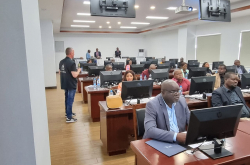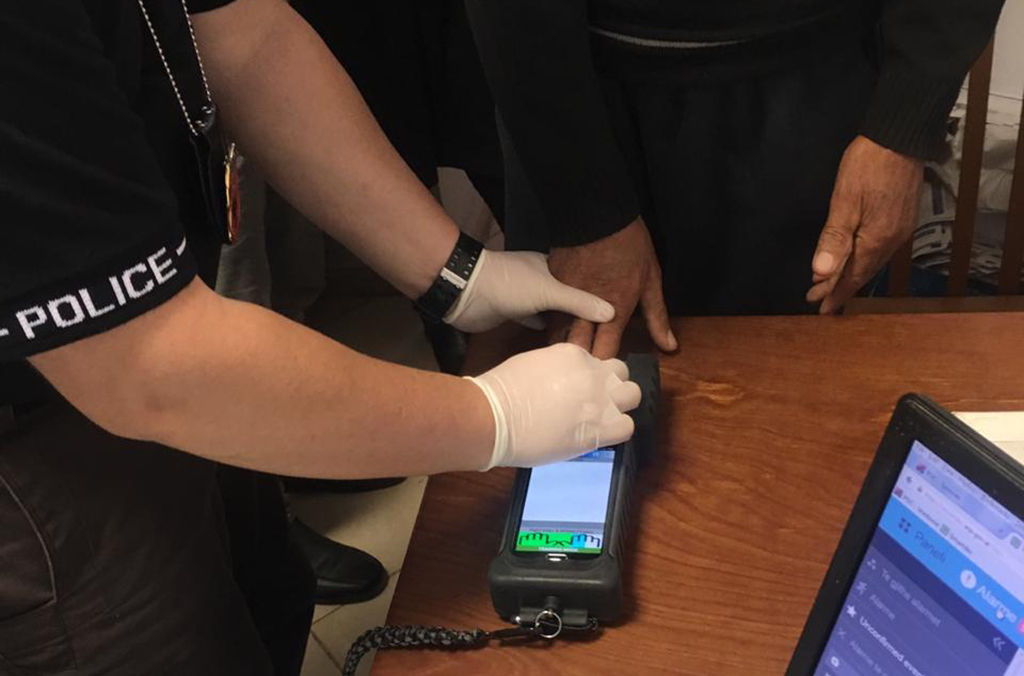The HOTSPOT initiative uses biometric data to help detect foreign terrorist fighters and criminals who try to cross borders illegitimately. At the same time, it disrupts the networks that facilitate such travel.
INTERPOL’s databases of fingerprints and facial images are central to the project.
In the first instance, the project aims to increase the number of checks that our member countries make against the two databases. In the long term, this will help detect foreign terrorist fighters and criminals who try to cross borders using irregular migration flows.
On top of this, HOTSPOT Operations bring together several key stakeholders such as INTERPOL National Central Bureaus (NCBs), intelligence, border police, and migration services over a three to four day period.
As part of the operations, INTERPOL:
- Trains national officers in the use of handheld biometric collection devices;
- Promotes cooperation by establishing contacts with police units and agencies;
- Provides a combination of technical infrastructure, mobile technology and training to deliver a sustainable and integrated mechanism to reinforce border security.
Frontline checks
Law enforcement officers at remote frontline locations around the world can crosscheck biometric information against INTERPOL’s face and fingerprint databases.
Results are returned in real time. This means that, in the event of a match, follow-up action can be taken immediately.
Mobile devices
Where there is a reliable Internet connection, checks are made directly against INTERPOL’s Automatic Fingerprint Identification System (AFIS) using the Organization’s secure global police communications system known as I-24/7.
If there is a lack of Internet coverage, the cross-checking of biometric data is triggered the next time an Internet connection is reached. In this way, biometric checks can be carried out in remote locations or where technical infrastructure is inadequate.
Implementation
HOTSPOT is designed as a flexible concept that can be implemented worldwide, according to the specific needs of member countries.
In the course of our operations, we cover many different locations, such as border crossings, green lines, reception/detention centres for irregular migrants, and police stations.
HOTSPOT Operations 2022
HOTSPOT Mediterranean
Bosnia and Herzegovina
23 - 28 May 2022
Bosnia and Herzegovina has faced serious challenges relating to foreign terrorist fighters since the 1990s. Other challenges in the country relate to irregular migration.
In this context, INTERPOL launched its HOTSPOT Mediterranean Operation in the Irregular Migration Centre’s in Sarajevo and Bihac areas.
Highlights:
- 23 national officers were trained in biometric collection and crosscheck submissions via INTERPOL’s Automatic Fingerprint Identification System (AFIS);
- 481 profiles of suspected individuals were collected and crosschecked against INTERPOL Fingerprints and Facial Recognition Databases;
- 1 facial hit for an individual wanted for human trafficking;
- 1 fingerprint hit for an individual who has criminal records related to drugs and alcohol smuggling.
Operation HOTSPOT Moldova
12 - 24 May 2022
Authorities crosschecked 1,147 profiles of suspected irregular migrants against INTERPOL databases. These crosschecks resulted in 9 hits against Red Notices, for individuals wanted for crimes such as fraud, armed robbery, drugs possession, assault, murder and counterfeit currency.
HOTSPOT Operations 2021
- Operation HOTSPOT Stonebrood, United Kingdom (52 crosschecks);
- Operation HOTSPOT Slovenia (69 crosschecks);
- Operation HOTSPOT WB21, Albania, Montenegro, North Macedonia, Serbia (837 crosschecks).
Testing in the Western Balkans, 2019
A data collection and screening trial was conducted in Albania, Montenegro, North Macedonia and Serbia in September and October 2019. The testing phase provided a solid basis for the development and implementation of the HOTSPOT concept.
Related documents

See also
Related news

Border security threats focus of STOP operations in Africa
8 December 2023










